Blog
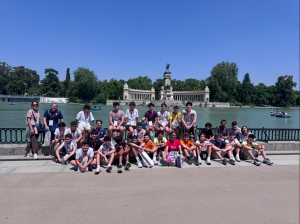
5 Must-See Monuments in Madrid
Madrid es una ciudad llena de historia, cultura y vida. Si planeas estudiar en España o simplemente visitar la capital, hay ciertos lugares que no te puedes perder. En este artículo te contamos cuáles son los 5 monumentos más importantes de Madrid para que no se te escape ninguno.

We have inaugurated our new school in Madrid!
On June 19th, we joyfully celebrated the opening of our new school in Madrid, a project designed to bring high-quality education closer to students and professionals in the capital.

The “Palos” of Flamenco: A Guide for Spanish Learners
The “palos” are the different styles or forms of expression within flamenco. Each has its own rhythm (compás), melodic structure, and emotional tone.
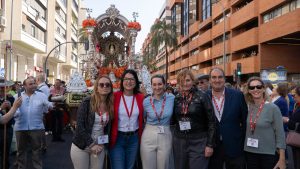
El Rocío: Tradition, Faith, and Culture in the Heart of Andalusia
Every spring, thousands of people travel along emotion-filled paths toward El Rocío, one of the most iconic pilgrimages in Spain. Discover this one-of-a-kind experience.
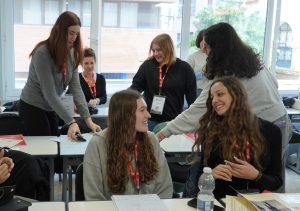
Language Courses for Teenagers in Seville and Madrid
Are you looking for a quality language course for your teenager? Do you want them to learn English or French in a dynamic environment, with expert teachers and classmates their age? At Carlos V Education, we have exactly what you need: language courses for teenagers in Seville and Madrid, designed to make learning a positive and enjoyable experience.

Carlos V at ICEF Spanish Education 2025: Connecting with the Future of International Education
Carlos V Education took part in ICEF Spanish Education 2025, strengthening international partnerships and reaffirming its commitment to global education.
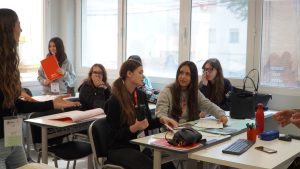
Foreign Language Courses at Carlos V Education
Discover how Foreign Language Courses at Carlos V Education can help you — or your children — master a new language with confidence, fluency, and motivation. We offer programs for all ages and goals.
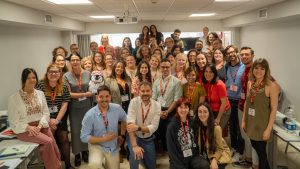
Carlos V Education: Education, Culture and Language Tourism for the World
At Carlos V Education, we have been bringing education, culture, and language tourism to students from all over the world for more than a decade.
Our vision has always been clear: to transform lives through language learning, cultural immersion, and international experience.
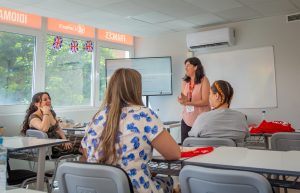
Expert Course in ELE: Advanced Training to Teach Spanish
We’ve just launched a new edition of our Expert Course: Teaching Tools for Spanish as a Foreign Language, a program designed for those seeking intensive, practical, and recognized training in the ELE field.

6 curiosities of the Holy Week in Seville
Holy Week in Seville is emotion, art and culture in its purest form. Discover how to live it, what vocabulary you need and what curiosities make it unique. Índice de contenidos 1. What is Holy Week in Seville? Holy Week is celebrated during the last week of Lent, from Palm Sunday to Easter Sunday. During these days, more than 60 brotherhoods organize processions all over the city. Each one carries its floats through the streets, accompanied by Nazarenes, costaleros, and marching bands. It’s a blend of religion, art, culture, and Andalusian identity. For the people of Seville, it’s not just a tradition: it’s part of their soul. 2. How is this tradition experienced? During Holy Week, Seville doesn’t sleep. Processions begin in the morning and can last until the early hours of the next day. The streets are filled with incense, saetas, and absolute silence when the floats pass. Whether you’re religious or not, experiencing it live is unforgettable. Spanish learners find it a perfect opportunity to hear the language in a real, emotional and culturally rich context. 3. Typical vocabulary to understand Holy Week Paso: structure that carries the religious images. Costalero: person who carries the float on their neck and back. Cofradía / Hermandad: religious group that organizes each procession. Nazareno: person who takes part in the procession, usually wearing a tunic and a cone-shaped hood. Saeta: a traditional flamenco-style song interpreted from balconies in honor of the images. Capirote: cone-shaped hood worn by the Nazarenes. Cirial: tall candle carried by some members of the procession. 4. 6 Surprising facts that will amaze you Some processions walk for more than 10 hours without rest. The most popular brotherhoods, like La Macarena and El Gran Poder, draw thousands of people. La Madrugá on Good Friday is one of the most intense moments: processions go on all night long. The city comes to a halt: streets are closed, traffic disappears, classes are cancelled, and many businesses reduce hours. Balconies are decorated with red and purple fabrics, and the streets smell of incense and orange blossom. Some Nazarenes make religious promises and walk barefoot for kilometers as an act of penance. Some even carry crosses or walk in complete silence without raising their gaze. Studying Spanish in Seville during Holy Week is experiencing the language through the heart of the culture. If you want to combine language immersion with unforgettable experiences, Carlos V Education opens the doors for you.
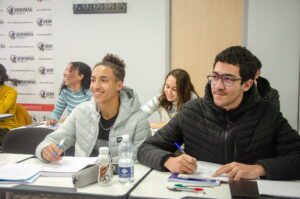
6 tips for new Spanish students
Learning Spanish opens doors to new cultures and opportunities. Follow these tips to improve quickly and enjoy the process:

5 Tips for Making the Perfect Paella
Paella is one of the most iconic dishes of Spanish cuisine, and preparing it at home can be an unforgettable experience. Here are five tips to help you create a delicious and authentic paella.

5 Reasons to Study Spanish in Seville
If you’re looking for the perfect place to learn Spanish, Seville is the ideal choice. With its rich history, vibrant culture, and welcoming atmosphere, this Andalusian city offers a complete language immersion experience.

Improve Your Spanish Pronunciation with These Tongue Twisters
If you are learning Spanish, practicing tongue twisters is a fun and effective way to improve your diction and fluency. These challenging phrases will help you perfect your pronunciation and gain confidence when speaking.

DELE, SIELE, and CCSE: Which One Do You Need and Why?
If you want to certify your Spanish level or need to meet an official requirement, you’ve probably come across these three exams: DELE, SIELE, and CCSE. But which one is right for you? Here’s a simple breakdown! DELE (Diploma of Spanish as a Foreign Language) Certifies your Spanish level worldwide. Official diploma, valid for life. Paper-based exam with fixed dates. Ideal for students, professionals, and those applying for Spanish nationality. SIELE (International Spanish Language Evaluation Service) Also certifies Spanish proficiency but in a digital and flexible format. Results in three weeks, valid for five years. Can be taken online or at authorized test centers, anytime. Perfect for those needing a quick certification for studies or work. CCSE (Constitutional and Sociocultural Knowledge of Spain Test) Does not assess Spanish language skills but rather knowledge of Spain. Essential for obtaining Spanish nationality. Multiple-choice test with 25 questions, completed in about 45 minutes. Which One to Choose? If you need Spanish nationality, go for the DELE A2 (to prove language proficiency) and the CCSE (to demonstrate knowledge of Spain). If you’re looking to certify your Spanish for studies or work, choose between DELE (valid for life) or SIELE (fast and flexible). At Carlos V Education, we are an official exam center and can guide you in choosing the right test. We’re here to support you every step of the way!

Group Programs: Discover Spain and Its Culture
Exploring Spain as a group is a unique experience. At Carlos V Education, we offer programs that combine Spanish learning with cultural activities, ensuring total immersion. With over 10 years of experience, we guarantee a well-organized and enriching educational experience.
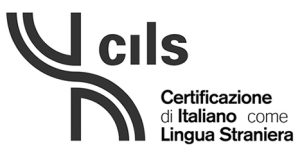
We are now a CILS Examination Center!
At Carlos V Education, we are proud to announce that we are now an official examination center for CILS, the Certification of Italian as a Foreign Language issued by the prestigious University for Foreigners of Siena.

The Most Popular Spanish Proverbs and Their Meaning
Learning a language is not just about knowing its grammar and vocabulary but also immersing yourself in its culture and expressions. In Spain, proverbs are a part of everyday speech and reflect the country’s history and traditions. In this article, we explore some of the most popular Spanish proverbs and their meanings.

Joining FEDELE Madrid
2025 started with great news for us: Idiomas Carlos V Madrid is now part of FEDELE Madrid, one of the regional associations of the Spanish Federation of Schools of Spanish as a Foreign Language.

Learning the language through Spanish cuisine
At Carlos V Education, we believe that the best way to learn a language is to immerse yourself in its culture, and there’s no better way to do this than through food. One of our most appreciated activities, both by students and teacher groups, is our Spanish cooking workshop, where culinary art becomes a bridge to learning Spanish.

Carlos V Education: A Multicultural Team
Carlos V Education: A Multicultural Team At Carlos V Education, we not only offer an unforgettable educational experience but also serve as a reflection of the cultural diversity and richness that we are so passionate about. Our team is composed of professionals from over ten different nationalities, including Poland, Italy, Morocco, the United States, the United Kingdom, and Germany, among others. This diversity not only defines us but also enriches every aspect of our daily work. Diversity and Shared Passion Our team, both teaching and non-teaching staff, shares a love for languages, culture, and engaging with students. Each member brings their unique experience, creating a one-of-a-kind educational environment. Promoting Local Culture We are committed to promoting local culture by organizing activities that allow students to immerse themselves and learn in a practical and dynamic way, enjoying our culture in the best way possible: through its streets, monuments, and restaurants. A Multilingual Team Many of our team members are bilingual or multilingual, facilitating communication and enhancing the learning experience for our students. At Carlos V Education, multiculturalism is at the heart of everything we do, creating an environment where diversity is celebrated. Join our multicultural experience! Contact us: rrhh@carlosveducation.com

New Collaboration Agreement with Quirónsalud to Provide Healthcare Coverage for Our Students
We are pleased to announce that Carlos V Education has signed a Collaboration Agreement with Grupo Quirónsalud, Spain’s leading healthcare group with an extensive network of facilities throughout the country. Thanks to this agreement, our international students with private health insurance will benefit from high-quality medical care and numerous advantages tailored specifically to their needs. Policy Benefits Our students will now have access to exceptional healthcare services through Quirónsalud, including: 24/7 Multilingual Assistance: Students will receive assistance in multiple languages via the helpline (+34 901 123 456) at any time of the day. This ensures clear and comfortable communication in case of an emergency or medical need. Quick Diagnosis and Digital Prescriptions: By contacting Quirónsalud, students will receive an initial diagnosis over the phone. For minor cases, they may obtain a digital prescription, enabling them to access treatment without needing to travel. Comprehensive Administrative Support: Quirónsalud will handle all administrative procedures following the consultation, minimizing the paperwork required from students. Coverage Across Spain: Quirónsalud’s extensive network of hospitals and centers ensures coverage for students even when traveling within Spain. Compatibility with Multiple Insurers: Quirónsalud collaborates with a wide range of insurance providers, ensuring that most of our students can easily benefit from this agreement. Our Commitment to the Well-being of Our Educational Community At Carlos V Education, we are dedicated to providing a comprehensive and secure experience for our international students. This agreement with Grupo Quirónsalud is another step forward in our mission to ensure that their stay in Spain is as comfortable and safe as possible. We hope this new partnership brings peace of mind and confidence to our students and their families! Beneficios de la póliza Nuestros estudiantes ahora podrán acceder a una asistencia sanitaria excepcional con Quirónsalud, que incluye: Atención multilingüe 24/7: Recibirán atención en varios idiomas en el teléfono (+34 901 123 456) a cualquier hora del día. Esto les permitirá comunicarse de manera cómoda y clara en caso de una emergencia o necesidad médica. Diagnóstico rápido y receta digital: Al contactar con Quirónsalud, los estudiantes recibirán un primer diagnóstico telefónico. Si el caso es leve, podrían obtener una receta digital, lo cual facilita el acceso a tratamiento sin necesidad de desplazarse. Gestión administrativa completa: Quirónsalud se encargará de todos los trámites administrativos posteriores a la consulta, reduciendo al mínimo las gestiones necesarias para el estudiante. Cobertura en toda España: La red de hospitales y centros de Quirónsalud tiene amplia presencia en gran parte de España, por lo que los estudiantes estarán cubiertos incluso si viajan dentro del país. Compatibilidad con múltiples seguros: Quirónsalud trabaja con un gran número de aseguradoras, lo que asegura que la mayoría de nuestros estudiantes puedan beneficiarse del convenio sin problemas. Nuestro compromiso con el bienestar de nuestra comunidad educativa En Carlos V Education, estamos comprometidos en proporcionar una experiencia completa y segura para nuestros estudiantes internacionales. Este convenio con Grupo Quirónsalud es un paso más en nuestro esfuerzo por ofrecer una estancia en España lo más cómoda y segura posible. ¡Esperamos que este nuevo acuerdo aporte tranquilidad y confianza a nuestros estudiantes y sus familias!

Carlos V Education joins “Foro Turismo Málaga-Costa del Sol”
We are pleased to announce that Carlos V Education has joined the Foro Turismo Málaga-Costa del Sol, a key platform in the development of tourism in the region. This partnership strengthens our commitment to language tourism, providing us with new opportunities to enrich our educational and cultural programs. Thanks to this collaboration, we will enhance our presence in the region and create synergies with other entities in the sector, allowing us to establish strategic connections with local businesses and increase our visibility. This network of contacts will open up new growth opportunities, further improving the educational offerings at our schools. With this new phase, we continue to strengthen our mission of offering unique experiences that connect language and culture, creating an ideal environment for learning in Spain. Additionally, this step positions us as a key player in the educational and tourism ecosystem of the Costa del Sol, opening doors to future collaborations that will indirectly enrich our students’ experience.

Why Study at an Accredited Instituto Cervantes Center?
At Carlos V Education, our schools in Seville, Málaga, and Madrid hold accreditation from the Instituto Cervantes, a mark of quality that ensures top-tier Spanish instruction. But what does this accreditation mean, and why is it important?

Carlos V Education fosters new international connections from ICEF Berlin
The International Relations team of Carlos V Education attended ICEF Berlin, one of the most important events in the international education industry. The event brought together educational institutions, agents, and program providers to strengthen collaboration networks. During the convention, our team formed new strategic partnerships, explored innovative opportunities for our students, and updated themselves on the latest sector trends. Thanks to ICEF, we continue to expand international opportunities for those choosing to study with us. We’re excited for what’s to come!

New Addition from Poland!
We are pleased to announce that we have taken an important step in strengthening the Carlos V Education brand in the Polish market. From now on, we have Marcin Siemdaj as our delegate, who will be instrumental in representing our company in Poland. Marcin will not only be the visible face of Carlos V Education in the country but will also take on the task of organizing events and actively promoting our brand and Spanish language education. With his extensive experience and deep understanding of the Polish market, we are confident he will connect with the local community and generate greater interest in our educational products and services. Our relationship with Marcin dates back to 2016, when we first made contact with Poland. Over the years, he has worked at the Extenda office, closely following our progress and actively contributing to our growth. Now, as our exclusive delegate in Poland, we are confident that his appointment will mark a turning point in this market. With his support, we are convinced that we will not only consolidate our presence but also strengthen ties with the local community, boosting interest in the Spanish language and culture. Don’t forget to follow our social media and blog to stay updated on the activities and events we will be organizing in Poland! We are thrilled about this new chapter and certain that Marcin will play a key role in this process. Welcome aboard, Marcin!

5 Advantages of studying Spanish at Idiomas Carlos V Madrid
Madrid offers endless opportunities to learn and improve Spanish, but choosing the right learning center makes all the difference. Idiomas Carlos V Madrid offers a unique educational experience. Here are five key advantages:

Carlos V Education Celebrates Erasmus Days 2024
At Carlos V Education, we are thrilled to participate in the Erasmus Days 2024, an initiative that celebrates the global impact of the Erasmus+ program. As proud hosts of the program, we have welcomed hundreds of Erasmus+ students from countries like Poland, the Czech Republic, France, and Germany. On October 17th, we will represent our institution in a videoconference with two prestigious French institutions: Lycée Polyvalent Jean Moulin and Lycée Professionnel Arthur Rimbaud.

Carlos V Education: New Member of the Spain-U.S. Chamber of Commerce in Florida
As part of our commitment to internationalization and the growth of our educational project, we are proud to announce that we have joined the Spain-U.S. Chamber of Commerce in Florida. This decision demonstrates our commitment to strengthening our relationships in the U.S., where interest in learning Spanish and language tourism is on the rise. The United States represents a key market for us as an organization specializing in teaching Spanish. With a growing Spanish-speaking population and increasing demand for the language in professional, academic, and cultural fields, the country has become a point of reference for those seeking to improve their Spanish language skills. Additionally, language tourism — an experience that combines language learning with cultural immersion — has sparked significant interest among American students. More and more people are choosing to travel to Spain to perfect their Spanish while enjoying our rich culture and traditions. The Spain-U.S. Chamber of Commerce in Florida, an institution with more than 40 years of history, plays a crucial role in fostering commercial relations between the two countries. Our incorporation gives us a privileged platform to establish strategic connections, access networking events, and collaborate with companies and organizations that share our vision for growth in the North American market. Through this alliance, we aim not only to enhance our visibility in the United States but also to offer unique and personalized experiences to students and professionals who wish to learn Spanish with Carlos V, either at our facilities or through immersion programs in Spain, where we offer a wide range of activities to explore different Spanish destinations. With the support of the Spain-U.S. Chamber of Commerce in Florida, we are confident that we will strengthen our presence and better adapt to the needs of a global audience. Our mission remains the same: to offer a high-quality educational experience, based on a passion for the Spanish language and the culture that surrounds it.

Experience Your Passion for Football in Spain
If you’ve ever dreamed of learning Spanish while immersing yourself in the life and culture of Spain, now is the time. Studying Spanish not only opens the doors to new personal and professional opportunities, but also connects you with a culture rich in history, art, gastronomy, and of course, football. Explore Spain Beyond the Classroom Learning a language goes beyond books and classes. With Carlos V Education, you will have the opportunity to explore Spain in a fully immersive way. Cultural visits, social and sports activities, and the chance to meet people from all over the world who, like you, are living this adventure of learning and discovery.In addition to Spanish classes, you can participate in a wide range of activities that will help you integrate into everyday Spanish life. With each conversation and interaction, your confidence in the language will grow, and what once seemed complicated will become part of your daily routine. Discover Our Football Programs In collaboration with prestigious clubs like Sevilla FC, we offer football programs that allow you to train and compete in a professional environment while improving your Spanish. It’s a perfect combination of language and sport, where you’ll learn from the best and experience football in its most authentic form. Whether you come for the language, the football, or both, Carlos V Education has the perfect program for you. Discover Spain, learn Spanish, and live an experience that will change your life!

Carlos V Education celebrates its 10th Anniversary
Ten Years of Excellence in Spanish Language Teaching and Language Tourism At Carlos V Education, a leading company in language tourism and a group of schools specialized in language teaching, we are celebrating our 10th anniversary. Throughout this decade, we have established ourselves as a benchmark in the teaching of Spanish and in the organization of cultural experiences that have impacted students from all over the world. To commemorate this important milestone, we have organized a special event in which our entire team, partners and collaborators will participate, as well as guests who have been a fundamental part of our trajectory. The event will take place at La Galería, in the Los Remedios neighborhood, on September 5. During the celebration, we will remember our achievements and project the future of our company, maintaining our commitment to offer educational experiences of excellence. We express our gratitude to all those who have been part of our history and reaffirm our mission to continue innovating in the field of language tourism and the teaching of Spanish, a language that acts as a bridge between cultures and opens doors to new opportunities around the world.

Five Reasons to Study Spanish in Malaga
If you are looking for an enriching Spanish learning experience, Malaga presents itself as the ideal destination. Bathed in sunshine for most of the year and cradled by the waters of the Mediterranean, this city is much more than a picturesque place to study Spanish; it is an immersive journey into the language, culture and natural beauty of Spain.
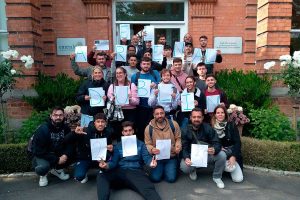
Getting to know Dublin with Carlos V Languages: a language immersion abroad for students (VIDEO)
Enjoying a few days of language immersion abroad is one of the most satisfying language learning experiences you can have. Getting to know Dublin (or any foreign city), living and interacting with people in a foreign language makes us strive to understand and be understood, which results in a better command of a foreign language. And accompanying it with cultural activities, leisure and fun complete the experience so that it lasts in our memory.

Learning a language with social networks: challenges and strategies for the 21st century.
Learning a language with social networks: challenges and strategies for the 21st century. Self-directed language learning has changed as a result of the use of digital technology, and there are now countless online tools and spaces with great learning potential. In 2001, a framework for assessing communicative competence in foreign languages was created: the Common European Framework of Reference for Languages (CEFR), which places particular emphasis on “using a language for independent communication” (Mc Dermott., 2013). Information technologies, particularly social networks, have recently had an impact on the daily lives of everyone in general and the academic community in particular (Slim & Hafedh, 2019). It is due to their numerous formats, which allow people to interact in a variety of ways, including blogs, social networks such as Facebook, Instagram, microblogs such as Twitter, wikis such as Wikipedia, video podcasts, and photo-sharing applications such as Snapchat. Apps such as YouTube, Facebook, Twitter and WhatsApp have significantly increased social engagement and information sharing in communities of learners and teachers. Learning a language with social media can be easy. Students are motivated by the use of educational technology because it promotes independent learning, engagement and cooperation, and can easily adapt to multiple learning styles. Language acquisition is essentially social and interactive, hence this strategy enhances learning. Social networks bring dynamic satisfaction to language learning. And when something does not seem like a laborious task, we tend to try a little harder while appearing to try a little less. You can interact with others, both native speakers and other students who are learning the same language as you. Plus, consider the fact that you can complete this task entirely from home! Electronic devices and social networks provide learners with the opportunity to engage in collaborative learning and give them the option to share resources with their peers (Gikas & Grant, 2013). The use of social networks and mobile devices has advantages and disadvantages, with the advantages being primarily found in the ease of access to course materials, videos, and the transfer of lesson plans, among other things. In general, students believe that social networks and mobile devices are the most accessible and affordable means of learning about current topics. Studies in Western countries have revealed that the use of online social networks for collaborative learning significantly affects students’ academic success and satisfaction (Zhu, 2012). According to the study by Dhanya (2016) and Namaziandost and Nasri (2019), students can improve their language skills through the variety of opportunities provided by social networks. In addition, social networks allow learners to engage in relevant and continuous dialogue on these social networking sites, which the researchers found improves language production and reduces anxiety. Because of their multimodal, multilingual, and multipurpose nature, today’s online resources and sites present learners with an almost overwhelming variety of options (Gomez-Parra, M. E., & Huertas-abril, 2020). In order to use the online resources that best suit their needs in this situation, whether in terms of level or ability, autonomous language learners must acquire a number of new skills. Digital competence, knowing how to learn, motivation, responsibility and tenacity are some of the skills that are undoubtedly important. However, turning these online materials into practical and beneficial language learning environments is a challenging task, especially when learners are completely independent (as in the case of language learning through free access websites or OER). To solve this, the autonomous learner must be digitally literate and must develop strategies for using social networks to increase their autonomy. Learning a language with social networks: tips and strategies The following tips and strategies that a self-directed learner can adopt when learning a language with social networks: Facebook YouTube Twitter Change the language in your phone settings Facebook It is an excellent environment to connect and interact with language learners if you are dedicated to getting to know them. In addition, there are multilingual general language learner groups available. You can find several groups to choose from in almost any language if you use the Facebook search box to search for language study groups. The purpose is to socialize in learning. As an English expression goes, which we translate into English: “It doesn’t matter where you hang your hat as long as you meet your new acquaintances.” Youtube For language learners, YouTube is a real treasure trove of social media. Use hashtags associated with the language you want to study to make the most of what’s on offer. These channels can be useful, for example, if you’re learning German. Looking for recommendations on where to get French videos? You’re also covered here. Not to worry! Twitter Reading tweets on Twitter in another language can be entertaining and useful for learning. There is no need to overthink things, and the appeal of casually exchanging information is present. The language learning app and program Duolingo also has a Twitter account. They share amusing tidbits about numerous languages. Change the language in your phone settings Most of us operate our phones quite intuitively and can quickly choose from several alternatives (Khan, 2022). Change the language of your device to the one you want to study. It’s simple: select [your target language] in Settings > General > Language & Region > Device Language. Even if it can be a bit more complicated, you can still use your phone in a different language if you have a fundamental understanding of how it works. Finally, to learn a language with social networks, don’t be shy. Participate in discussions by joining these channels. It’s not always simple, but keep in mind that you will probably never meet these people in person, and even if you do, they are probably too busy worrying about others’ impressions of them to worry about whether you make a mistake! Don’t be afraid to make mistakes or ask questions. You are all learning together, and the person who is correcting your mistake once made a mistake that is identical to the one you are correcting now. Remember that and enjoy

Linguistic anxiety and self-study during foreign language learning.
Anxiety during language learning has been extensively researched and numerous elements have been identified as possible causes. It has been established that anxiety in a foreign language classroom, whether physical or virtual, is distinct from other types of anxiety and that it negatively affects both proficiency and the rate of language acquisition. Language anxiety” when learning a foreign language can stem from a variety of factors; some of these include the learner, the teacher, the instructional approach or the methodology. Low self-esteem, false assumptions about language learning, unfavorable encounters with the foreign language or culture, or the overall language learning experience can be sources of anxiety (Russell, 2020). Language anxiety is “a distinct complex of self-perceptions, beliefs, feelings, and behaviors related to language learning that arises from the uniqueness of the language learning process” (Horwitz, Horwitz, & Cope; 1986). Remember that learning a language in a naturalistic setting, such as by immersion while traveling or residing abroad, is not related to the type of anxiety associated with language learning in a traditional or online classroom. A student who self-studies a foreign language online, on the other hand, may have an advantage in that they do not have to struggle with communication apprehension as is evident in physical classrooms. However, they suffer from test anxiety “the tendency to view with alarm the consequences of inadequate performance in an evaluative situation” (Sarason, 1984, p. 214). Some students are not good candidates for online language learning, especially those who lack the drive and/or self-discipline necessary to take ownership of their own learning. In addition, online learners must allocate sufficient time to complete the course on time, ask for help when needed, and be willing to learn despite being emotionally and physically isolated from their peers (Russell & Murphy-Judy, 2020; White, 2010). Some students with high levels of language anxiety may decide to enroll in an online course because they want the comfort of anonymity and the assurance that they will not have to participate as much in speaking exercises or contact with other students (Pichette, 2009). As a result, learners may experience anxiety related to both the language and the use of educational technologies used to communicate in the target language. However, online language learners are generally required to interact with other learners and their instructor, if applicable, in the target language using audio and video tools. More precisely, to enhance their learning and reduce their language anxiety, learners must find a way to engage in synchronous conversations with a native speaker. Strategies for Overcoming Foreign Language Anxiety Fear of negative evaluation, test anxiety, and communication apprehension are the most common influencing factors among self-directed learners with respect to foreign language learning. Language learners who have low self-esteem, negative internal dialogue, or a general lack of confidence in their language skills may be more prone to anxiety (Almekhlafy, 2020). The use of techniques including mindfulness exercises, cognitive behavioral therapy, and relaxation techniques have been shown to help language learners overcome their anxieties and progress more quickly. The following strategies can be employed to overcome language anxiety or fear when learning a foreign language: Focus on the real goal: communication: Speaking perfectly is not the goal of learning a foreign language. Apart from the ridiculous amount of pressure it puts on you, expecting you to speak without making mistakes isn’t very reasonable either. Therefore, it is vital to concentrate solely on communicating, but you need to know enough words to do this, so develop your vocabulary. To do this, use dictionaries with pronunciation and audio that you can imitate and make sure you are familiar with the most typical nouns and verbs in your target language. It will be beneficial to commit to acquiring a specific number of common nouns and verbs, for example, seven per week or one per day, and then it is advisable to speak with native speakers as often as possible to practice your new vocabulary. Shift your emphasis from speaking accurately to communicating and you will feel the tension melt away, and most likely make fewer mistakes! Set achievable goals: If your perfectionism makes you aim for the unattainable, you won’t make much progress in your language learning. Making sure your language learning goals are reasonable and achievable will help you avoid feeling worse when you can’t meet them. Language perfectionism and language anxiety feed each other. Here are some examples of typical unattainable language learning goals and their realistic equivalents: Unrealistic: Even though I’m just starting out, I’ll speak perfectly if I practice and study hard. Realistic: I cannot hope to avoid using mutilated terminology. To become fluent, I must go through many phases of fluency. What I can do is track how many mistakes I make while striving to make fewer. Transform unproductive ideas: You may be familiar with the term “cognitive distortion,” which refers to incorrect, irrational, negative thought processes that lead us to believe we are less than. For example, you might go to a party and say, “The people there won’t like me,” even though you have no idea how they will react to you. Also, how could complete strangers have an opinion about you? Now is the time to identify the cognitive distortions that impede your achievement in learning a language. We may catch ourselves in the act if we can identify what they are. Some of the most common cognitive distortions related to language learning are: Should: “By now, I should be fluent”. Personalization: “Because of my foreign accent, the cashier was very mean to me.” Filtered: “I just spoke with perfect grammar and excellent fluency, but the one word I mispronounced is all that matters.” Generalization: “I’d better give up since a native speaker couldn’t understand me when I tried to speak Italian years ago.” Control fallacies: my life is so busy with work and family that I will never get the chance to learn French, so I can’t help it if it’s bad. Language anxiety is unpleasant, but

Floral tribute to the Hermandad del Rocío of Seville as it passes through our school.
One more year, for the days of May (“I am happy with my people”, continues the Sevillian), the pilgrims of El Rocío head to the village to accompany the Virgin on Pentecost Sunday. Thousands of people make the Camino to meet the Blanca Paloma as a symbol of faith and Spanish cultural tradition, and at Idiomas Carlos V we wanted to accompany them with a floral offering.
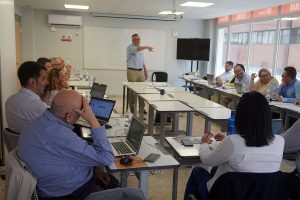
Idiomas Carlos V Seville hosts the General Assembly of the Spanish Association for Foreigners in Andalusia (AEEA)
The facilities of the Carlos V Language School in Seville hosted the General Assembly of the Association of Spanish Schools for Foreigners of Andalusia (AEEA), an entity that represents accredited Private Spanish Schools for Foreigners that offer a wide range of Spanish Courses in the most attractive locations in Andalusia. The event, which was attended by XX members of the AEEA, included a training day for managers and the general assembly of the association, whose main objective is to guarantee the quality of teaching in its centers. In fact, all AEEA member schools have the Certificate of Accreditation of the Cervantes Institute, and periodically all of them undergo a pedagogical and professional inspection. In this way, it is guaranteed that the teaching offered by the AEEA centers is always at the highest level. Spanish Courses for Foreigners The Spanish Association for Foreigners in Andalusia offers through its member schools a wide range of language courses, from general language courses to courses for professionals, adapted to the age and level of knowledge of the student. In this way, the student of any of these schools will find a complementary program of activities that makes his stay in the center even more attractive and several possibilities of accommodation, all of them of the highest quality.
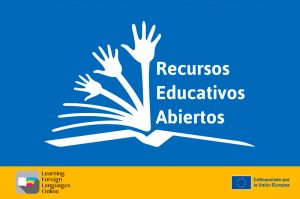
Open Educational Resources: opening up foreign language education
Do you know the term Open Educational Resources, also known by its acronym OER? It refers to learning, teaching and research materials in any format or medium that are in the public domain or that are protected by copyright and published under an open license, allowing free access, reuse, repurposing, adaptation and redistribution by others. Its literal translation in English would be Open Educational Resources (UNESCO, 2022). According to the article published on the Learning Foreign Languages Online (LFLO) blog, Open Educational Resources (OER) grants users rights that are normally only granted to authors and publishers due to an open license, including the freedom to modify the original work and the ability to distribute derivatives for free. The OER movement began as a global grassroots phenomenon in the late 20th and early 21st centuries, when educators aspired to develop intellectual content that would be accessible to Internet audiences (Blyth, 2017). As an alternative to traditional textbooks and expensive web-based learning resources, Open Educational Resources in language learning have recently attracted the attention of language educators, curriculum developers, and academics. OER provide access to controlled language practice, self-learning, engagement and learning satisfaction, among other advantages for language learners. In addition, these resources can support cutting-edge teaching strategies that address constructivist and interactionist theories of second language acquisition (Scott & Cherrez, 2022). Open Educational Resources are a unique tool to foster learning and information sharing, which are necessary to establish inclusive knowledge societies and meet the Sustainable Development Goals (SDGs). The OERs, or Open Educational Resources, revolution The Open Educational Resources (OERs) movement/revolution, open or open education, is based on a set of ideas shared by a remarkably wide range of scholars, including the belief that knowledge should be free and open for use and reuse, that collaboration should be easier rather than harder, that individuals should be recognized for their contributions to education and research, and that concepts and ideas are linked in unexpected and surprising ways rather than in the straightforward linear ways presented in most textbooks. Open education promises to radically change the way writers, teachers, and students communicate around the world (Baraniuk, 2007, p. 229). This open education revolution has led to the emergence of “open content,” a term used to refer to any published digital content that can be freely used. Open content, in terms of pedagogy, comes with open access and open source. Open access refers to material that is made publicly available on the Internet without specific permission to edit it. Open source content, on the other hand, allows users to reuse and repurpose content to create original creations. To cope with the rising costs, OER advocates focused on creating and disseminating free resources for the first ten years of the movement. However, the movement has begun to focus on empirical research to determine the effect of OER on student learning, including foreign language (LE) learning, in its second decade. In addition, open educators are beginning to investigate various methods for integrating OER into mainstream education. In summary, the open education movement has four main objectives: (a) to democratize education and thus expand the “knowledge ecosystem”, (b) to reduce the high prices of pedagogical materials, (c) to accelerate the production of materials, and (d) allow students and teachers to modify materials to make them more appropriate to the particular circumstances of their communities (Blyth, 2012). Here we present some suggestions and reputable OER repositories (ROER) for foreign language learners who are new to OER and find it difficult to recognize credible resources among the plethora of OER: How to become an informal language learner: learners should be exposed to the target language as much as possible while learning a foreign language. When learning occurs in non-immersive environments where the target language is not used, it is extremely important to remember this. In addition, learning a language involves much more than learning its grammar and vocabulary; as a result, pragmatic and sociocultural elements should be included in the language learning curriculum and learners should choose to learn through resources that facilitate their language learning. How to navigate and locate OER? The Internet is undoubtedly awash with resources for LE learners. For starters, learners can choose CC Search CC Search Portal (creativecommons.org) where learners can find open content in different formats: images, music, text, and videos. In addition to OER Commons (OER Commons) there is another OER public digital library. Accredited ROERs can also be joined: some well-known ROERs for foreign language learners are the following (Perifanou, M. and Economides, 2021): COERLL: The Center for Open Educational Resources and Language Learning creates and disseminates language OER in the following languages: Arabic, Bengali, Chinese, Czech, English, French, German, Hebrew, Hindi, Italian, Japanese, K’iche’, Malayalam, Nahuatl, Persian, Portuguese, Russian, Sanskrit, Spanish, Tamil, Turkish, Urdu and Yoruba. It sponsors initiatives for language OER and teacher professional development, plans events for open language education, publishes textbooks, and does much more. Supports the Language OER Network (LOERN), a network of ambassadors, creators, reviewers and teachers of open educational resources. MERLOT: multimedia educational resource for online learning and teaching offering peer-reviewed online teaching and learning materials. Over 3000 world language resources are listed, including animations, quizzes, exercises and practices, e-portfolios, online courses, journal articles, presentations, simulations and tutorials. The following languages have OER available: Less Taught Languages, Multilingual Resources. Portuguese, Russian, Spanish and Arabic, Chinese, ESL or EFL, French, German, Greek, Hebrew, Italian, Japanese, Korean, Latin, Russian, Spanish and more. Support Language OER Network (LOERN), a network of ambassadors, creators, reviewers and teachers of open educational resources. OpenLearn: the UK’s supported Open University offers more than 1,000 free courses in eight different subject areas. Courses also include interactive activities, quizzes, audios and movies. The learner can access and download a free participation statement after successful completion of a free course to use with a digital badge (if the course offers one). Most courses have reviews and a Creative Commons (CC) license. There are 67 language e-books and 79 language courses (44 introductory,
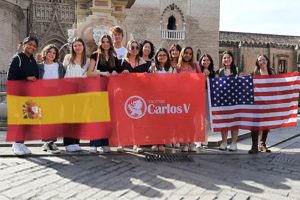
Reverse language immersion: host a student from the U.S. in your home
Do you want your children to live a linguistic immersion at home and practice English with native kids of their age? In Idiomas Carlos V we are looking for you: within the International Mobility Programs that we usually organize in our offices in Seville and Malaga for foreign students, we are looking for host families for young people between 14 and 17 years old from the United States.
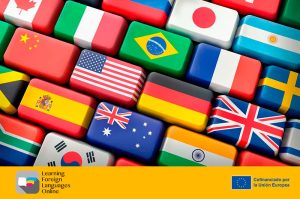
Learning languages online: how to learn a language without access to a native speaker
Because of its interest and relation to language learning we share in our blog this article by Kelsea Mucherino, Erasmus coordinator of Eurospeak, one of the partners participating in Learning Foreign Languages Online (LFLO), originally published on the project’s website. Learning languages online: how to learn a language without access to a native speaker How can we learn to communicate without interacting? By Kelsea Mucherino In the course of the COVID-19 pandemic, there has been a widespread loss of jobs across Europe, leading thousands of people to seek employment. This has led to a massive increase in the number of people who have decided to undertake the daunting task of improving their foreign language skills by learning languages online. This is backed up by evidence from Google, between the start of the pandemic and now: “Language learning with YouTube” has increased by 750%. “Language learning solutions” by 450%. “Better language learning tools” by 300%. “Learning languages with Netflix” by 250%. By now, many people have realized that having a foreign language up your sleeve can be a competitive advantage when applying for jobs, and it also opens up the possibility of working remotely (or even face-to-face, eventually) around the world. Therefore, it is not surprising that many people have tried to do so while there were restrictions and they were glued to the screens of their electronic devices. Unfortunately, learning languages online, knowing how to communicate in a foreign language without human interaction, is very difficult. Even with all the time and motivation in the world, it is not an easy task to learn a foreign language without being immersed in the language or having access to native speakers to practice the skills. Even if you memorize a lot of vocabulary words and grammar rules, it will not be enough to be able to communicate in a foreign language. Language learning is interactive in nature, but what do we do when the “interaction” piece is missing? Fortunately, it is quite possible to hone communication skills even without being in the presence of someone with whom you can practice. Even if you are currently taking foreign language classes, you may find it especially difficult to put into practice what you have learned outside of class. Below is an activity you can do on your own to develop communication skills in a foreign language using the resources available to you. Before you start practicing languages online, it is important to keep in mind that successful communication requires a different part of your brain than the one that stores knowledge of grammar and vocabulary and therefore requires you to use different “study” techniques while learning. We strongly recommend supplementing communicative learning with concrete and explicit grammar exercises to help you gain accuracy in speaking, but the following method is designed to help you access the part of your brain that deals with contextual learning rather than the part where memorization (vocabulary and grammar rules) are stored. With this method, we encourage you to focus more on phrases and multi-word units rather than individual words to get an overall “feel” for the language. This will help you develop something known as native-like selection, or the ability to choose the most “natural” sounding way to say a sentence. Research has confirmed that watching TV and movies in the target language at least compensates to some extent for the lack of “authentic input”. Thus you can provide a context for learning the social functions of a language. Applying the following learning methodology is therefore a fun and effective way to gain exposure to the target language while increasing your repertoire of vocabulary and phrases that you can understand and use while interacting in the future. Methodology for learning languages online Start by identifying an interesting movie or series that comes directly from the target language community. It is imperative that the movie or series you choose is an authentic source, i.e. made by native speakers of the target language, so that you have a native source of input for learning. Make sure that subtitles are available in both your language and the target language. Note: We suggest doing this exercise using a series with episodes between 20 and 30 minutes long, but if you are brave and want a challenge, you can try a full-length movie or longer TV episodes. Now, the next step depends on your language level. If you are a beginner, start by watching an episode or a movie with subtitles in your native language first. You should be able to understand what is going on in the story before you try to concentrate on learning the language. Get a general idea of the plot and try to pay attention to what words and phrases are used in what situations. If you are an upper-intermediate or advanced learner, you can skip this step if you feel comfortable enough and go directly to the next step. Once you have an understanding of the story of what you are trying to watch, you can begin to focus on the language. Switch the subtitles to the target language and watch the same episode or movie again. This time, you will have prior knowledge of the plot, which will allow you to focus your attention on the target language itself.You should be able to recognize words and phrases in the target language that you remember from your last viewing. As a very basic example, if you watched a movie about a cat, but didn’t know the word “cat” you should be able to easily recognize the word now when “cat” is referred to in the episode.Note: Don’t worry if you still don’t understand much of what is being said, as this is common: simply being exposed to the language and knowing what is happening in the story is part of the learning journey. Re-watch the episode with subtitles in your native language and in the target language as many times as necessary; this will be different
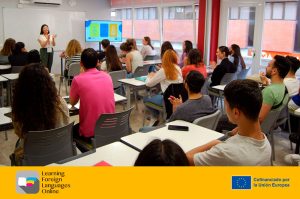
How to learn languages online: connecting languages and cultures on one platform
How to learn languages online: connecting languages and cultures on one platform Learning languages is the desire of many people around the world. However, for various reasons, it is something that most of them do not do. Therefore, as a solution, the Learning Foreign Languages Online (LFLO) platform provides everyone with free resources and tools to facilitate the purpose of learning languages. To spread the word about the platform, we organized an event at Idiomas Carlos V Seville with Spanish students of different nationalities enrolled in the School, Spanish students of German enrolled in the International Mobility Program ‘Vamos Europa’, and Italian Erasmus+ students who were visiting our city. The event took place on April 20 at Carlos V’s facilities and was attended by students of different nationalities who are learning German, Spanish and English. The students were able to practice the languages they are learning, have fun, test their skills and interact and get to know each other with other language students of the school. The event was also attended by some of the teachers of Carlos V Languages, who were very happy to see their students in action, putting into practice what they have learned in class and using a tool to support their studies. The project website includes a free resource bank for students to support their language studies. This resource bank has been developed by five partners from different European countries: Eurospeak Language Schools from the United Kingdom; Instytut Nowych Technologii from Poland; Innovation Hive from Greece; Ustanova za obrazovanje odraslih Maksima from Croatia; and the Carlos V Language School as the Spanish representative. The LFLO project seeks to facilitate the strengthening of skills in the learning of Spanish, English, Italian, German, French, Croatian and Polish languages and to learn languages online. Students can find different resources that will help them improve and deepen their skills whether they are beginners (Level A1) or advanced (Level C1). In addition, learners can also find tips on how to take advantage of these resources which contain exercises on grammar, vocabulary, pronunciation, reading, listening, writing and speaking. During the day the three groups of participants underwent different language tests to practice their knowledge and improve communication between them, some of them with difficulty, but always with good humor and the occasional “challenge” between groups. Finally, the event ended with a raffle of Idiomas Carlos V t-shirts, caps and backpacks, which further enlivened the good atmosphere that prevailed throughout the day. This is shown in the picture with which we closed the day, full of smiles after a day in which everyone was able to experience how to learn languages online.
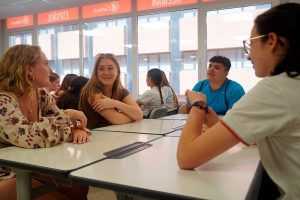
English-Spanish exchange day at Idiomas Carlos V in Seville
This Wednesday we have lived in the classrooms of the Carlos V Language School in Seville a day of English-Spanish exchange between Spanish students of English enrolled in our school and young Americans visiting Spain. The American group, from Bishop Fenwick High School in Boston (Massachusetts), is currently visiting our country and getting to know the most beautiful corners of Andalusia. From Seville, where they are staying during their stay in Spain, they will get to know the secrets of Cordoba and its Mosque, Granada and the Alhambra or the beauty of the Tacita de Plata in Cadiz. English-Spanish Exchange Among so many activities and cultural visits, we could not miss learning and improving languages: specifically in this case taking the opportunity to do an English-Spanish exchange (or “tandem”) with young Spaniards. Thus, about 15 boys and girls who are currently studying English at Carlos V Languages spent a few hours with the young Americans to practice both English and Spanish with a central theme that, given the date, could not go unnoticed: the April Fair. Thus, in this way, they talked about everything that can be found on the Real de Abril: Sevillanas, casetas, gypsy costumes and their flounces, horse-drawn carriages and even rebujito. In short, a nice experience as a cultural exchange between young people united by a common denominator: their desire to learn and improve languages.
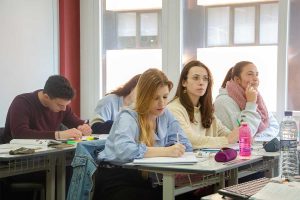
New intensive English courses in Seville, sign up!
On the 12th of April, we begin new intensive English courses at the Carlos V Language School in Seville. The courses, aimed at B1, B2, and C1 levels, will be held from Monday to Thursday, two hours per day, and will be taught by our team of native teachers. Moreover, if you are a student at Idiomas Carlos V, you can enjoy free Sevillanas classes! If you want to learn English, improve your level, and prepare for a Cambridge official exam, now is your moment. At Idiomas Carlos V Seville, we have been a Cambridge exam preparation centre since 2014, and hundreds of students have obtained their certificates with us. Do you want to be the next? In the intensive English courses at Idiomas Carlos V Seville, you will learn the content corresponding to B1, B2, and C1 levels of the Common European Framework of Reference. We offer classes in small groups of up to 12 students for a more personalised and close approach. Furthermore, you will learn English with our team of native teachers and a methodology that we have been improving for over 15 years of experience. Want to meet them? Take a look at Jeff, David, Maria, Sam, and the rest of the teaching team at Idiomas Carlos V Seville. On the 12th of April, we begin new intensive English courses, but as you know, at Idiomas Carlos V, we also offer German, French, and Italian courses designed and tailored for all kinds of people. Depending on your level, profile, or preferences when it comes to studying, you can choose between our intensive and academic courses, as well as prepare for an official certification such as Cambridge, TOEFL, TELC, or DELE. Additionally, we collaborate with the Vamos Europa Mobility Programme, training young Spaniards to work in Germany. B1, B2, C1… What’s my level? For all students to make the most of their training, they must start with a homogeneous level. The intensive English courses at Idiomas Carlos V are aimed at B1, B2, and C1 levels, but students don’t always know their exact level. Often, we say we have an “intermediate” level of English, a term so commonly used and subjective that it often doesn’t match reality. That’s why, at the Carlos V Language School, we offer everyone the chance to take a free and non-binding placement test to objectively determine their level of English. This way, the teacher will know which group suits the student’s level best, and both the student and the teacher will make the most out of the classes. Next step: Cambridge? Once a student has completed one of the intensive English courses, they can choose to prepare with us to certify their level with an official Cambridge Title. The official Cambridge English accreditation is recognised by over 20,000 organisations and public bodies worldwide, and our students have the option to take the Cambridge exam at our own facilities, where they will have been preparing for two weeks, helping them avoid nerves or any possible “stage fright” on exam day. Additionally, apart from the in-person Cambridge exam, at Idiomas Carlos V Seville, we also offer the possibility of taking the new Cambridge LinguaSkill exam, on a computer, with results delivered in 48 hours in a fast and accurate manner, allowing you to certify your English level in just two days. If you have any questions or would like to know more, or if you’re ready to enrol in our intensive English courses, come to Idiomas Carlos V Seville or give us a call at (954 063 174) and improve your English level.

